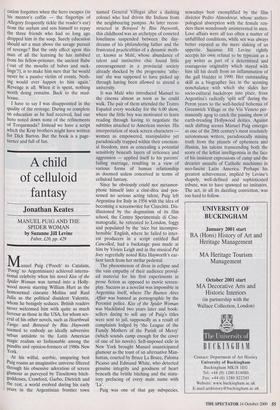A child of celluloid fantasy
Jonathan Keates
MANUEL PUIG AND THE SPIDER WOMAN by Suzanne Jill Levine Faber, £20, pp. 429 Manuel Puig (Pooch' to Catalans, `Pooig' to Argentinians) achieved interna- tional celebrity when his novel Kiss of the Spider Woman was turned into a Holly- wood movie starring William Hurt as the homosexual cineaste Molina and Raul Julia as the political dissident Valentin, whom he benignly seduces. British readers never welcomed him with quite as much fervour as those in the USA, for whom sev- eral of his other novels, such as Heartbreak Tango and Betrayed by Rita Hayworth seemed to embody an ideally subversive urban antidote to the Latin American magic realism so fashionable among the Pundits and opinion-formers of 1980s New York, At his wilful, acerbic, unsparing best Puig roams an imaginative universe filtered through his obsessive adoration of screen glamour as purveyed by Tinseltown bitch- goddesses, Crawford, Garbo, Dietrich and the rest, a world evolved during his early Years in the Argentinian frontier town named General Villegas after a dashing colonel who had driven the Indians from the neighbouring pampas. As later recon- structed in Betrayed by Rita Hayworth, this childhood was an archetype of cosseted loneliness suspended between the day- dreams of his philandering father and the frustrated practicalities of a dynamic moth- er, known as Male, whose abundance of talent and instinctive chic found little encouragement in a provincial society already shocked by the progressive 'athe- ism' she was supposed to have picked up through having been allowed to attend a university.
It was Male who introduced Manuel to the cinema almost as soon as he could walk. The pair of them attended the Teatro Espanol every weekday for the 6.00 show, where the little boy was motivated to learn reading through having to negotiate the subtitles attached to American movies. His interpretation of stock screen characters women as empowered, manipulative yet paradoxically trapped within their emotion- al freedom, men as concealing a potential sensitivity beneath layers of reticence and aggression — applied itself to his parents' failing marriage, resulting in a view of various forms of human relationship as doomed unless conceived in terms of celluloid fantasy.
Since he obviously could not metamor- phose himself into a cine-diva and pos- sessed no serious acting talent, Puig left Argentina for Italy in 1956 with the idea of becoming a screenwriter for Cinecitta. Dis- illusioned by the dogmatism of its film school, the Centro Sperimentale di Cine- matografie, he retreated to London, foggy and populated by the 'nice but incompre- hensible' English, where he failed to inter- est producers in a script entitled Ball Cancelled, had a backstage pass made at him by Vivien Leigh and in the musical Pal Joey regretfully noted Rita Hayworth's ear- liest lurch from her stellar pedestal.
The phenomenon of divas in eclipse and the vain empathy of their audience provid- ed material for his first experiments in prose fiction as opposed to movie screen- play. Success as a novelist was impossible in Argentina itself, where The Buenos Aires Affair was banned as pornographic by the Peronist police. Kiss of the Spider Woman was blacklisted two years later and book- sellers daring to sell any of Puig's titles were sent to jail, supposedly as a result of complaints lodged by 'the League of the Family Mothers of the Parish of Mercy' (which sounds camp enough for the cover of one of his novels). Self-imposed exile in New York brought Manuel unanticipated glamour as the toast of an alternative Man- hattan, courted by Bruce La Bruce, Paloma Picasso and Edmund White, who detected genuine integrity and goodness of heart beneath the brittle bitching and the statu- tory prefacing of every male name with `La'.
Puig was one of that gay subspecies, nowadays best exemplified by the film director Pedro Almodovar, whose anthro- pological absorption with the female ren- ders them wondrously uninterested in men. Love affairs were all too often a matter of unfulfilled conditions, while sex was always better enjoyed as the mere slaking of an appetite. Suzanne Jill Levine rightly accepts his own refusal to be typecast as a gay writer as part of a determined and courageous originality which stayed with him till his death from an inflammation of the gall bladder in 1990. Her outstanding skill as a biographer lies in the seeming nonchalance with which she slides her socio-cultural backdrops into place, from Argentina's radically 'split self during the Peron years to the well-heeled bohemia of Greenwich Village or the Via Veneto per- manently agog to catch the passing show of earth-treading Hollywood deities. Against such shifting scenes Manuel Puig emerges as one of the 20th century's most resolutely autonomous writers, paradoxically mining truth from the planets of ephemera and illusion, his talents transcending both the scorn of the leftist intelligentsia in the face of his insistent expressions of camp and the drearier assaults of Catholic machismo in neo-fascist Latin America. Perhaps his greatest achievement, implied by Levine's shapely, well-defined and sophisticated tribute, was to have spawned no imitators. The act, in all its dazzling conviction, was too hard to follow.


















































































 Previous page
Previous page